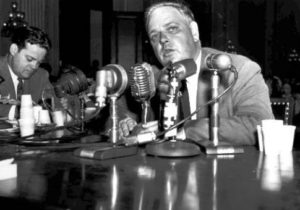 What startled many readers of Whittaker Chambers’s Witness when it first was published in 1952 (and became a bestseller) was its deeply spiritual tone, its message of returning to faith in God, not only for the sake of individual salvation but also for the hope of salvaging Western civilization.
What startled many readers of Whittaker Chambers’s Witness when it first was published in 1952 (and became a bestseller) was its deeply spiritual tone, its message of returning to faith in God, not only for the sake of individual salvation but also for the hope of salvaging Western civilization.
Chambers had been a avowed atheist, an ideological stance influenced by his dysfunctional family upbringing, the nihilism communicated to him by his university education, and his commitment to changing the world through communism.
One of his most famous lines about religious belief prior to his conversion shows not only his attitude but his ability to convey that attitude in memorable phrases:
I associated God with ill-ventilated vestries and ill-ventilated minds.
That attitude crumbled when he finally faced the truth of the Christian faith. There is one passage in Witness that best describes what happened to him when the Spirit of God touched his life, and that passage is even more memorable than the one noted above:
What I had been fell from me like dirty rags. The rags that fell from me were not only Communism. What fell was the whole web of the materialist modern mind—the luminous shroud which it has spun about the spirit of man, paralyzing in the name of rationalism the instinct of his soul for God, denying in the name of knowledge the reality of the soul and its birthright in that mystery on which mere knowledge falters and shatters at every step.
 It was that touch from the hand of God that led Chambers to his decision to make his witness before the world—not just a testimony about what he knew of the workings of the communist underground and its designs to overthrow the American government—but a witness to the grace of God in men’s lives.
It was that touch from the hand of God that led Chambers to his decision to make his witness before the world—not just a testimony about what he knew of the workings of the communist underground and its designs to overthrow the American government—but a witness to the grace of God in men’s lives.
Yet it was that very witness that most intellectuals rejected. They didn’t understand how Chambers could embrace the “old” faith that so many of them now despised. This is why Chambers, near the end of Witness, wrote this:
To those for whom the intellect alone has force, such a witness has little or no force. It bewilders and exasperates them. It challenges them to suppose that there is something greater about man than his ability to add and subtract. It submits that that something is the soul.
What’s interesting is that Chambers saw a clear demarcation between those intellectuals and the majority of the population:
Plain men understood the witness easily. It speaks directly to their condition. For it is peculiarly the Christian witness. They still hear it, whenever it truly reaches their ears, the ring of those glad tidings that once stirred mankind with an immense hope.
For it frees them from the trap of irreversible Fate at the point at which it whispers to them that each soul is individually responsible to God, that it has only to assert that responsibility, and out of man’s weakness will come strength, out of his corruption incorruption, out of his evil good, and out of what is false invulnerable truth.
 Why did Chambers believe that weakness could become strength, that corruption could be transformed into incorruption, that good could be squeezed out of evil, and that falsehoods could nevertheless lead men to see the truth?
Why did Chambers believe that weakness could become strength, that corruption could be transformed into incorruption, that good could be squeezed out of evil, and that falsehoods could nevertheless lead men to see the truth?
He could believe all of that because it happened in his life. He responded to the Christian message, he acknowledged that he was individually responsible to God, and he took the necessary steps to assert that responsibility by proclaiming the witness God had given him through his own personal experience.
The message hasn’t changed. God hasn’t changed. All of us need to respond as Chambers did. We need to make our individual witnesses to the world. We are all individually responsible to God and need to take whatever steps are necessary to make our witness.

